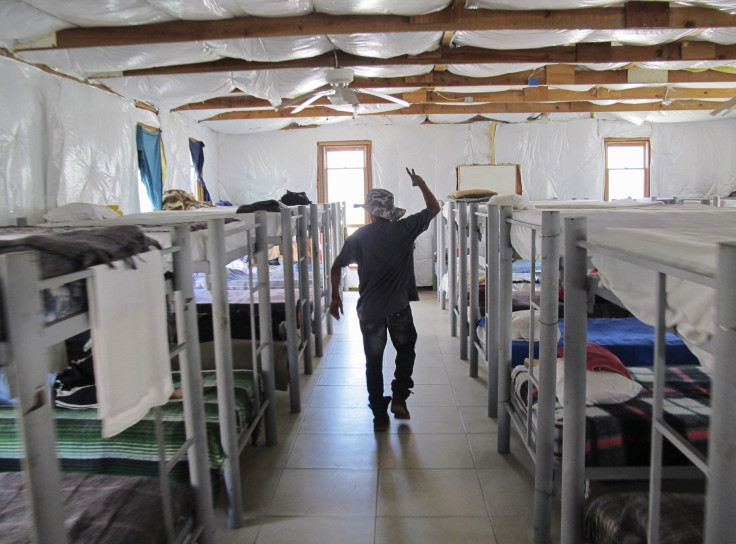United Nations Calls On Mexico To End Detention Of Child Migrants

The Obama administration is facing increasing pressure over the detention of migrant mothers and children awaiting deportation hearings – a practice condemned by immigrant rights’ groups, Catholic bishops and dozens of congressional Democrats alike. But across the border, Mexico is also feeling the heat as the United Nations urged it this week to end its growing detentions of child migrants.
Mexico dramatically stepped up its immigration enforcement last year under its “Southern Border Plan” as tens of thousands of migrants, mostly unaccompanied children and families, traveled north from Honduras, Guatemala and El Salvador. As a result, the government sharply increased migrant detentions and deportations. According to national statistics, Mexico detained 23,096 children in 2014 for their immigration status, out of a total of 127,149 migrant detainees that year.
The United Nations Committee on the Rights of the Child drew attention to the detention issue Wednesday in Geneva, when the committee presented an assessment of children’s rights in a handful of countries, including Mexico. According to news agency Efe, the committee put particular emphasis on the issue of child migrant detentions, recommending Mexico stop administrative detentions for child migrants and focus on alternative measures.
The committee expressed concern about “migrant children being kept in detention centers for migrants and reports of violence and abuse against children in those centers,” according to a 22-page list of conclusions published Wednesday. It also called on Mexico to use detention alternatives for migrant mothers who are apprehended along with young children.
Human rights groups in the U.S. have been highlighting the issue of migrant children in detention since the Obama administration began expanding the use of family detention centers last summer. A federal judge ruled earlier this year that the practice violated an earlier legal settlement. The government only has a matter of days to work out an agreement on family detentions or it will face a potential court order to release the detainees.
But in Mexico, the government isn’t facing the same legal challenges to detaining migrant children and families. Meanwhile, the country has continued to ramp up deportations of Central American migrants. The Washington Office on Latin America (WOLA), a U.S. think tank, noted that this year Mexico is deporting almost as many unaccompanied children as the U.S. Border Patrol is apprehending at the U.S.-Mexico border. “The numerical similarity makes clear that Mexico has taken on a new role as an immigration enforcer, and that this role has come at least partially in response to U.S. pressure,” WOLA wrote in an analysis. “Moreover, these statistics reveal that -- though the impact is not being felt as strongly at the U.S. border -- Central American migrants continue to flee north in large numbers.”
Those high deportation numbers have stoked concerns that migrants fleeing violence in Central America – El Salvador, Honduras and Guatemala have among the highest homicide rates in the world – aren’t being properly screened for asylum protection or other forms of relief and are being deported back to life-threatening situations.
In El Salvador, the murder rate has spiked to historic levels as the police and street gangs up the aggression against each other. May was the deadliest month in the country in 20 years, with 635 murders recorded. Meanwhile, just this past weekend 77 people were killed, marking an average of 25 murders per day. The number of Salvadorans deported from Mexico in the first five months of 2015 grew by 44.3 percent compared to the same period last year, according to El Salvador’s government statistics.The U.S. deported 23.7 percent fewer Salvadorans this year compared to 2014.
In Honduras, which currently has the highest homicide rate in the world outside a warzone, around 30 percent of the approximate 30,000 deported Hondurans said they were trying to escape violence in the country, according to a report by the Pastoral of Human Mobility in Honduras, a nongovernmental organization.
In Mexico, a May survey by polling firm Parametria found that the majority of Mexicans – 69 percent – knew “little” or “nothing” about the thousands of child migrants that have entered in the country, compared to 25 percent who said they knew “a lot.” But the same survey found Mexicans were split on how the government should handle the migration issue – 40 percent said the children should go through the traditional legal process to determine if they should be deported or get relief, while 43 percent said authorities should accelerate processing and deportations, even if it meant some eligible for asylum were deported as well.
© Copyright IBTimes 2024. All rights reserved.






















